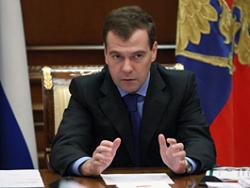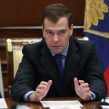
Medvedev Enjoys Foreign Policy “Successes”
Publication: Eurasia Daily Monitor Volume: 7 Issue: 222
By:

Russian President, Dmitry Medvedev, has completed an unprecedented foreign policy marathon that started on October 19, with the a trilateral meeting in Deauville with French President, Nicolas Sarkozy, and German Chancellor, Angela Merkel, followed by the summits of the G20, Organization for Security and Cooperation in Europe (OSCE), NATO and the EU, APEC, ASEAN and the Caspian “five,” as well as official visits to Vietnam, South Korea and Poland. The final stretch of this high level diplomacy late last week involved the overlapping Moscow summits of several post-Soviet organizations, from the most inclusive Commonwealth of Independent States (CIS) to the narrower Collective Security Treaty Organization (CSTO), where Azerbaijan, Moldova, Turkmenistan and Ukraine are not participating, and to the tri-party Customs Union of Belarus, Kazakhstan and Russia. Medvedev duly expressed his satisfaction with the results of the “engaged, occasionally emotional discussions,” but these results are in fact rather dubious (Nezavisimaya Gazeta, www.gazeta.ru, December 10).
The most significant agreement was achieved in the Customs Union framework, which could facilitate free movement of goods between the three states by 2012, though a mechanism for resolving trade disputes is yet to be established (Vremya Novostei, December 10). The price Moscow had to pay for this deal amounted to cancelling the customs duties for oil exported to Belarus, which will cost its budget about $2 billion in 2011 (Kommersant, December 10). This concession has miraculously erased all the tensions between Moscow and Minsk, so President, Alyaksandr Lukashenka, now enters the final phase of his presidential campaign with the extra bonus of winning the noisy quarrel with Medvedev (www.gazeta.ru, December 9).
It remains unclear how this much-trumpeted “common economic space” would work if Russia finally joins the World Trade Organization (WTO) in 2011, after ironing out the last complications with the US and the EU (Vedomosti, RBC Daily, December 10). Moscow still tries to pull Ukraine into the Customs Union, but President, Viktor Yanukovych, confirmed only his intention to participate fully in economic cooperation in the CIS (Regnum, December 10). Yanukovych held a meeting with Medvedev on the sidelines of the summit, but it was as fruitless as their previous talks in November, and Ukraine is now set to proceed with reforming Naftogaz and declining Gazprom’s not-too-friendly takeover bid (Nezavisimaya Gazeta, December 9).
Medvedev insisted particularly that the CSTO “did not commit any fatal mistakes” in the crisis in Kyrgyzstan last June, which is true only in the sense that the organization was irrelevant when one of its member-states faced a massive humanitarian disaster. Newly-approved changes in its charter make it possible to respond better and faster, but this flexibility would hardly make much difference because Russia’s power-projection capabilities remain limited, while the position of other allies would vary from abstention to strong objection: Belarus adheres to the former position, and Uzbekistan makes no secret of its stance on the latter (Kommersant, December 11). As for Kazakhstan, its President Nursultan Nazarbayev is rather cross with Moscow for its rather unhelpful behavior during the OSCE summit in Astana, in which he invested much effort and prestige (Vremya Novostei, December 2).
One of the planned achievements of that summit was a symbolic rapprochement between Armenia and Azerbaijan mediated by Russia; what happened instead was an exchange of deliberately hostile statements (Nezavisimaya Gazeta, December 8). Presidents Serzh Sargsyan and Ilham Aliyev attended the CIS summit in Moscow, but Medvedev made no effort at reconciling their differences and remains sincerely unconcerned about growing tensions over Karabakh. It appears probable that this demonstrative indifference is at least partly related to one particular file in the WikiLeaks revelations recording Aliyev’s less than complimentary assessment of Medvedev in confidential exchanges with US officials (Regnum, November 29). Another part of the explanation could be the growing inclination of the junior member of the Russian ruling duumvirate to be associated only with good news, which is in rather short supply in the Caucasus.
Rubbing shoulders with world leaders, from US President, Barack Obama, to Iran’s President, Mahmoud Ahmadinejad, for weeks on end has apparently inflated Medvedev’s self-perception and made him believe that the next presidency is his for the taking. In that, he resembles somewhat Deputy Prime Minister, Sergei Ivanov, who had viewed himself as a natural successor to Vladimir Putin until the latter cut him down to size opting for a younger “Robin.” Arkady Dvorkovich, one of Medvedev’s aides, created a small sensation last Friday by expressing his personal opinion –characteristically, in an interview with The Financial Times– that his boss wants to continue in the job and to implement the initiatives he has launched (Kommersant, December 11).
Medvedev’s ambitions are likely to be deflated already this week by two pre-scheduled events. On December 16, Putin will perform in the traditional live TV show “Talk with the country” for many hours answering questions from pre-selected audiences, which will demonstrate once again who is the real master of Russian politics (www.gazeta.ru, December 9). One day before, the judge in the Khamovnichesky court will announce the verdict in the crudely fabricated case against Mikhail Khodorkovsky and Platon Lebedev, and the words “guilty as charged” would reveal the resounding emptiness of Medvedev’s rhetoric on assuring the supremacy of law (Ekho Moskvy, December 10).
Answering question from the Polish media last week, Medvedev made the usual point that he “does not exclude the possibility” of pursuing a second term “if the situation in this country is normal and stable.” This pro forma condition could become meaningful and even crucial because the situation in Russia is visibly deteriorating. Last weekend, several cities, from Petropavlovsk-Kamchatsky to Samara, saw protest rallies against Medvedev’s idea of changing time zones, but the most alarming commotion happened in downtown Moscow where nationalists and football fans clashed furiously with OMON (Ezhednevny Zhurnal, December 12). The government is losing control over the violent destabilization of the North Caucasus, and this smoldering civil war could yet again become the decisive influence in Russia’s search for direction. Putin knows how to play the fear factor but he can lead the country only back –to political zastoi and economic stagnation and yet another state-failure-type of crisis.




